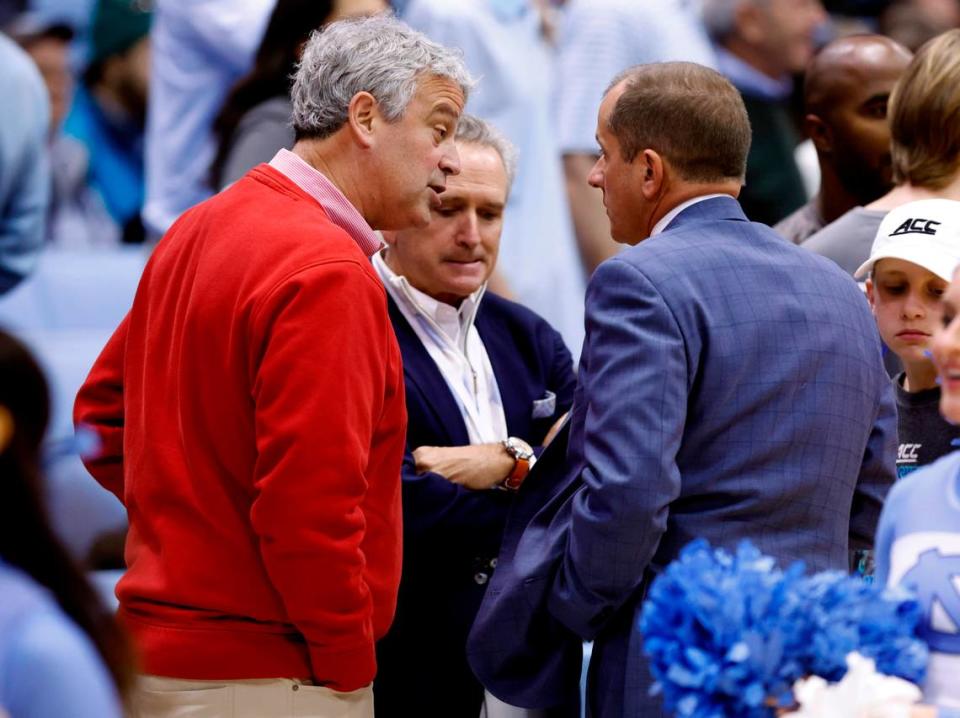ACC basketball preseason gathering feels like the end of an era, in more ways than one
They’re still here, for now, circulating among their current peers. Leonard Hamilton was the first ACC basketball coach roaming the hallways of the conference’s annual basketball media conclave at a Charlotte hotel Wednesday morning, Florida State still a member, for the moment.
This gathering already had an end-of-an-era feel to it with California and Stanford and Southern Methodist joining the league next season — this March’s ACC basketball tournament in Washington will almost certainly be the last where every team is invited to participate — but the subtext of both that expansion itself and ACC commissioner Jim Phillips’ remarks defending it Wednesday, in his first public forum since September’s vote, is far more sinister.
It’s not just about who’s coming. It’s about who might be leaving.
“Getting to 18 protects the ACC, now and into the future,” Phillips said. “Schools will ultimately make the decisions that they want.”
That sounds rational enough, but with the grant of rights holding the league together through 2036, why would it need protecting?
The answer to that question was the quiet subtext of the expansion vote. Everyone is saying it out loud now. The ACC lost confidence that it could hold itself together, and acted accordingly.
“This is like buying insurance for the future of the league,” Learfield founder Ben Sutton wrote in a text message to N.C. State chancellor Randy Woodson, a public record obtained by the News & Observer. “The ACC contract with ESPN requires 14 full members in the league. If Carolina and Virginia leave, by taking Cal and Stanford, you take no haircut. If FSU goes independent (they are seriously considering it), SMU could fill the gap.”

It’s the only logic by which these moves make sense, even if it’s circular logic: By preparing for the departure of some of its most important schools, it encouraged them to leave.
There’s certainly very few other explanations for the ACC’s actions. Adding three schools that are a combined 40-54 in football the past three seasons, all of whom agreed to let the other ACC schools divvy up the TV money they would normally get, is the definition of chasing money instead of success, even if Phillips comically argued the opposite on Wednesday.
There’s a name for what the ACC did: “building your downline” is what they call this in a pyramid scheme.
So what happens now?
The three schools that voted against expansion, very publicly — and Clemson, Florida State and North Carolina would not change their votes, after N.C. State flipped to the deciding yes, to make it ceremonially unanimous — also happen to be three of the ACC’s biggest brands, with the widest range of options should they decide to depart.
Of them, Florida State has the itchiest feet. Even before the expansion vote, the athletic department had hired JP Morgan Chase to pursue outside investment, the first step toward exiting the ACC on unfriendly terms.
The theory, as Sutton relayed, is that a private-equity firm will essentially purchase Florida State’s athletic program, giving it the resources to buy its way out of the grant of rights, and essentially make a large wager that the Seminoles are worth more on their own than they are in the ACC, especially this new, amorphous, watered-down ACC. And if and when the Seminoles find a way out, North Carolina and others — Clemson? Virginia? — will have a path to follow out of this bloated, 18-team, coast-to-coast mishmash.

So yes, this in many ways felt like a farewell to the old ACC, especially with the ongoing departures of the legendary coaches who have sustained the ACC’s basketball excellence for so long. A league that already felt the absence of Rick Pitino, Roy Williams and Mike Krzyzewski in recent years could on Wednesday sense the departures of strong personalities like Jim Boeheim, Mike Brey and Josh Pastner.
The league’s getting bigger now, but for how long? Any claims of stability are illusory. The only guarantee is that the ACC will continue to change, and nothing can stop that now.
Never miss a Luke DeCock column. Sign up at tinyurl.com/lukeslatest to have them delivered directly to your email inbox as soon as they post.
Luke DeCock’s Latest: Never miss a column on the Canes, ACC or other Triangle sports


